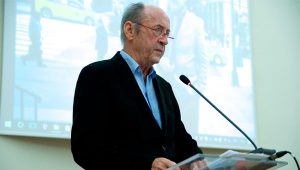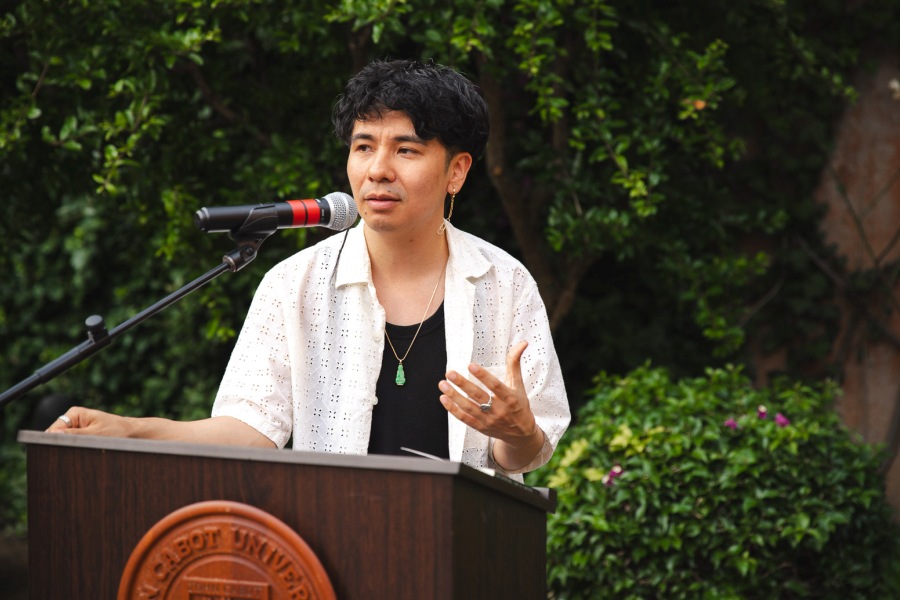Italy Reads 2017 Welcomes Poet Billy Collins and Astronaut Paolo Nespoli
On Thursday, October 12, John Cabot University Italy Reads welcomed former U.S. Poet Laureate Billy Collins for the Keynote Address on American poet Emily Dickinson. Italy Reads is JCU’s community-based reading and cultural exchange program that began in 2009 with a grant from the National Endowment for the Arts for The Big Read Rome. Billy Collins’ work has appeared in a variety of periodicals including The New Yorker, The Paris Review, and The American Scholar, he is a Guggenheim fellow and a New York Public Library “Literary Lion.” His last three collections of poems have broken sales records for poetry.
The event kicked off with a special greeting from Italian astronaut Paolo Nespoli of the European Space Agency, currently engaged in ASI Mission VITA on the International Space Station (ISS). Nespoli said,”I feel honored to have been invited to open Billy Collins’ keynote address for John Cabot University’s Italy Reads Program.” He then read the poem by Emily Dickinson, “There is a solitude of space,” which had been selected especially for this occasion by Billy Collins:
There is a solitude of space
A solitude of sea
A solitude of death, but these
Society shall be
Compared with that profounder site
That polar privacy
A soul admitted to itself –
Finite Infinity
Collins started his keynote speech stating that he is a “very reader-conscious poet.” High school English teachers, their students, and members of the JCU community were entertained by his ironic poems and calm yet engaging tone of voice. Collins read a few poems about daily situations he finds himself in and shared some childhood memories in his poems “Only child” and “The Lanyard.” He briefly discussed the poetry of Emily Dickinson, who “doesn’t give the meaning of her poems right away and thus manages to interest the reader.”
Watch Paolo Nespoli’s greeting from outer space.
Collins also wrote a few poems about his time in Italy. In particular, in his poem “I am not Italian,” he describes his immersion in Italian habits and culture:
“I am not Italian, technically speaking,
yet here I am leaning on a zinc bar in Florence
on a sunny weekday morning,
my foot up on the smooth iron railing
just like the other men, who,
it must be said, are officially and fully Italian.
It’s 8:40 and they are off to work,
some in offices, others sweeping the streets,
while I am off to a museum or a church
to see paintings, maybe light a candle in an alcove.
Yet here we all are in our suits and work shirts
joined in the brotherhood of espresso,
or how is it said? La fratellanza dell’espresso,
draining our little white cups
with a quick flourish of the wrist,
each of us tasting the same sweetness of life,
if you take a little sugar, and the bitterness
of its brevity, whether you choose to take sugar or not.”
At the end of the lecture, Collins reflected on his writing style, which has changed a lot over the years. He explained that irony – an inseparable element of his poetry – helps him to hide two parts of his personality: “The first one is sentimentality – from my mother. And the second one is cynicism – from my father. Irony is a line between them: it’s not terribly emotional, neither cold-hearted.”
The “Around Culture per il patrimonio culturale” organization captured the spirit of the event in a Facebook post, noting how thanks to Italy Reads, an Italian astronaut and explorer of the physical spaces of the universe, encountered America’s greatest contemporary poet and explorer of the metaphysical spaces of language.







